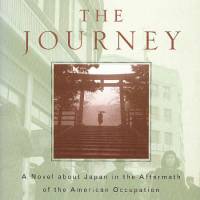On most lists of great 20th-century Japanese writers, Jiro Osaragi's name does not figure. He was popular and respected in his own day (1898-1973), mostly as a writer of historical fiction, but literary immortality has eluded him. So?
The Journey, Jiro Osaragi, Translated by Ivan Morris, TUTTLE PUBLISHING, Fiction.
After several readings, I'll take a chance and call "The Journey" a great novel. Which may mean no more than that I like it very much.
It's 1952. Peace and democracy in Japan are seven years old; the American Occupation has just ended. Japan is embarking on a new life, as are Osaragi's two young protagonists. They meet, fittingly, at a grave — his friend's, her cousin's. They become friends, fall in love, fall out of love; she, at least — Taeko — falls out of love with him, Ryunosuke, and goes her way alone. An admirable, modern young woman.
Ryunosuke fought and killed in the war, barely escaping with his life. The experience turned him into a bit of a rake and something of a gambler — a nice guy, but determined, whatever it takes, to make his way in the new Japan.
He's a new breed of Japanese man, just as Taeko is a new breed of Japanese woman: pretty rather than beautiful, competent rather than refined. She earns her own living as an office typist and declares, to the shock of some, that she prefers pachinko to the tea ceremony.
The supporting characters, unfortunately, there's no space to touch upon. Their journey is through postwar Japan in its infancy, as ours is through postwar Japan in its old age.
Read archived reviews of Japanese classics at jtimes.jp/essential.


















With your current subscription plan you can comment on stories. However, before writing your first comment, please create a display name in the Profile section of your subscriber account page.